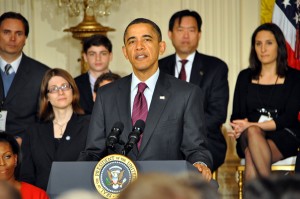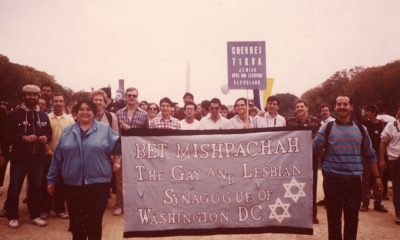National
Gay staffers take key roles in Obama campaign
From finance to digital initiatives, supporters working to win second term

[Editor’s note: This is the first of a two-part series.]
Engaging in tasks from fundraising to digital initiatives to public outreach, President Obama’s re-election campaign staff is already hard at work helping to secure a second term in the White House — and many members of the LGBT community have high-profile roles in that effort.
The Washington Blade interviewed four gay and lesbian staffers who are working to re-elect Obama from the campaign headquarters in Chicago. This article is the first in a two-part series and features interviews with two of the campaign workers: Rufus Gifford, the finance director, and Teddy Goff, the digital director.

President Obama’s campaign staff includes several high-profile gay members. (Blade file photo by Michael Key)
For Gifford, who’s gay, seeing Obama serve another two years in office is important because he believes the administration so far has been “two of the most productive years in American history.”
“I’ve been on board with the campaign in one way shape or form since January 2007 — nearly from the moment I met Sen. Obama,” Gifford said. “I was certainly a believer in him and his message and his politics, etc. So, I do believe that the last two years have been two of the very most productive years in American history. In my mind, truly, if we can get four more, think of how much more we can accomplish.”
Gifford said Obama’s accomplishments for the LGBT community — most notably “Don’t Ask, Don’t Tell” repeal — are “obviously very, very personally important” to him. Still, Gifford also counts among the president’s victories passage of the economic stimulus plan and health care reform as well as ratification of the START Treaty, a nuclear-arms reduction agreement.
As finance director, Gifford overseas the funds raised for both the Obama campaign as well as a joint committee that raises funds between the campaign and the Democratic National Committee. It’s similar to his role as finance director of the DNC, which he occupied immediately before joining the Obama campaign, and his role in raising money for Obama in California during the 2008 campaign.
“Every morning I start the day with a 9 a.m. senior staff meeting with the campaign leadership,” Gifford said. “I am a huge believer that finance should never be siloed within a campaign.”
Gifford said he believes the campaign will be stronger and raise more money if he’s talking to the directors of the field department, the digital department, the tech department and the communications department.
In the second quarter, fundraising for the Obama campaign beat expectations. Obama raised more than $86 million for his re-election campaign and the Democratic National Committee, which far outpaced Republican candidates seeking to oust him from the White House.
The third quarter numbers are yet to be made public. Media reports state that the campaign is expecting to rake in less cash because the president had to cancel fundraisers to attend debt ceiling negotiations with congressional leaders.
One difference that Gifford faces working with the Obama campaign in 2012 as opposed to his work in 2008 is the fact that he’s now separated from his partner, Jeremy Bernard, who serves as the White House social secretary.
In 2008, Gifford and Bernard were featured in numerous media outlets as a gay power couple and were named in Out magazine’s listing of the Top 50 power gays.
Gifford declined to comment on his separation from Bernard, but confirmed the couple split in 2009. Gifford’s current partner resides in D.C.
While Gifford manages fundraising for the Obama campaign, another gay member of the president’s re-election team, Goff, handles digital outreach efforts.
As digital director, Goff runs Internet communications for the campaign, which includes outreach via e-mail or social networking sites like Twitter and Facebook.
“Our job in the digital department is to talk to millions of Twitter followers, millions of e-mail subscribers, millions of Facebook fans everyday, and that’s a viewpoint that I think is helpful even in helping shape and inform broader discussions about how we talk to people and how we build,” Goff said.
Goff, who’s 26 and gay, comes to the Obama campaign after his most immediate position working with Blue State Digital, a digital agency in New York. In 2008, Goff ran digital programs at the state level for the Obama campaign.
Goff’s commitment to see Obama re-elected stems from the president’s record over the course of two-and-a-half years in office, which Goff said is “without parallel in my lifetime or even my parents’ lifetime.”
“So for me, he’s every bit as inspiring and compelling a figure as I ever thought he was.”
The main priority for 2011, Goff said, is making sure existing Obama supporters have avenues to make their voices heard.
What’s the best online platform for the Obama campaign to connect with its supporters? Goff said “everybody’s different” in the way they want to interact.
“There may be one person who wants to hear from us via e-mail, and another person who wants to hear from us on Twitter, but our point of view is that isn’t so much what matters,” Goff said. “Most things come and go. This time, four years ago, Myspace was a really big deal. Now people aren’t talking about that so much anymore. The perspective that we try to bring to it is what’s the basic content that’s going to engage people, how can we shape a relationship that’s going to make them feel engaged and feel like a part of the family.”
But the fight to re-elect Obama in 2012 could be more of a challenge than it was making sure he won the White House in 2008. Recent polls have placed Obama’s approval rating at its lowest point during the course of his term. A few weeks ago, Gallup found that Obama’s approval rating was at 39 percent, marking the first time his approval rating had dipped below 40 percent.
Gifford said he’s not in a position to say whether a win for Obama will be more challenging than it was in 2008, but asserted supporters will push on in the effort to claim victory.
Similarly, Goff said he doesn’t know if winning the White House will be more challenging for Obama in 2012, but said he expects the commitment of campaign workers would lead the president to victory.
The support that Obama will receive from the LGBT community in his re-election efforts remains to be seen. Significant milestones in LGBT rights occurred under his watch — most notably the passage of hate crimes legislation and repeal of “Don’t Ask, Don’t Tell.” Obama also received praise earlier this year for dropping the administration’s legal defense of the Defense of Marriage Act in court.
But other actions sought by the LGBT community remain outstanding — such as the enactment of employment protections based on sexual orientation and gender identity. The president’s lack of support for same-sex marriage riles some in the LGBT community as the fight to win marriage equality continues throughout the states.
Gifford said he’d tell anyone who says Obama hasn’t done enough on LGBT issues during his first term in office that “you cannot make the argument that this is not the most pro-gay administration in history.”
How can other LGBT people help who want to see Obama re-elected in 2012? Goff said those who are interested should check out the campaign website or participate in an on-the-ground field program that is being built in communities across the country.
“There are things for people who want to be involved only or primarily in LGBT issues,” Goff said. “We should have LGBT people do that, but also hope that LGBT people will get involved in the broad program and organize their community just like anybody else.”
U.S. Supreme Court
Supreme Court to consider bans on trans athletes in school sports
27 states have passed laws limiting participation in athletics programs

The U.S. Supreme Court on Thursday agreed to hear two cases involving transgender youth challenging bans prohibiting them from participating in school sports.
In Little v. Hecox, plaintiffs represented by the ACLU, Legal Voice, and the law firm Cooley are challenging Idaho’s 2020 ban, which requires sex testing to adjudicate questions of an athlete’s eligibility.
The 9th U.S. Circuit Court of Appeals described the process in a 2023 decision halting the policy’s enforcement pending an outcome in the litigation. The “sex dispute verification process, whereby any individual can ‘dispute’ the sex of any female student athlete in the state of Idaho,” the court wrote, would “require her to undergo intrusive medical procedures to verify her sex, including gynecological exams.”
In West Virginia v. B.P.J., Lambda Legal, the ACLU, the ACLU of West Virginia, and Cooley are representing a trans middle school student challenging the Mountain State’s 2021 ban on trans athletes.
The plaintiff was participating in cross country when the law was passed, taking puberty blockers that would have significantly reduced the chances that she could have a physiological advantage over cisgender peers.
“Like any other educational program, school athletic programs should be accessible for everyone regardless of their sex or transgender status,” said Joshua Block, senior counsel for the ACLU’s LGBTQ and HIV Project. “Trans kids play sports for the same reasons their peers do — to learn perseverance, dedication, teamwork, and to simply have fun with their friends,” Block said.
He added, “Categorically excluding kids from school sports just because they are transgender will only make our schools less safe and more hurtful places for all youth. We believe the lower courts were right to block these discriminatory laws, and we will continue to defend the freedom of all kids to play.”
“Our client just wants to play sports with her friends and peers,” said Lambda Legal Senior Counsel Tara Borelli. “Everyone understands the value of participating in team athletics, for fitness, leadership, socialization, and myriad other benefits.”
Borelli continued, “The U.S. Court of Appeals for the Fourth Circuit last April issued a thoughtful and thorough ruling allowing B.P.J. to continue participating in track events. That well-reasoned decision should stand the test of time, and we stand ready to defend it.”
Shortly after taking control of both legislative chambers, Republican members of Congress tried — unsuccessfully — to pass a national ban like those now enforced in 27 states since 2020.
Federal Government
UPenn erases Lia Thomas’s records as part of settlement with White House
University agreed to ban trans women from women’s sports teams

In a settlement with the Trump-Vance administration announced on Tuesday, the University of Pennsylvania will ban transgender athletes from competing and erase swimming records set by transgender former student Lia Thomas.
The U.S. Department of Education’s Office for Civil Rights found the university in violation of Title IX, the federal rights law barring sex based discrimination in educational institutions, by “permitting males to compete in women’s intercollegiate athletics and to occupy women-only intimate facilities.”
The statement issued by University of Pennsylvania President J. Larry Jameson highlighted how the law’s interpretation was changed substantially under President Donald Trump’s second term.
“The Department of Education OCR investigated the participation of one transgender athlete on the women’s swimming team three years ago, during the 2021-2022 swim season,” he wrote. “At that time, Penn was in compliance with NCAA eligibility rules and Title IX as then interpreted.”
Jameson continued, “Penn has always followed — and continues to follow — Title IX and the applicable policy of the NCAA regarding transgender athletes. NCAA eligibility rules changed in February 2025 with Executive Orders 14168 and 14201 and Penn will continue to adhere to these new rules.”
Writing that “we acknowledge that some student-athletes were disadvantaged by these rules” in place while Thomas was allowed to compete, the university president added, “We recognize this and will apologize to those who experienced a competitive disadvantage or experienced anxiety because of the policies in effect at the time.”
“Today’s resolution agreement with UPenn is yet another example of the Trump effect in action,” Education Secretary Linda McMahon said in a statement. “Thanks to the leadership of President Trump, UPenn has agreed both to apologize for its past Title IX violations and to ensure that women’s sports are protected at the university for future generations of female athletes.”
Under former President Joe Biden, the department’s Office of Civil Rights sought to protect against anti-LGBTQ discrimination in education, bringing investigations and enforcement actions in cases where school officials might, for example, require trans students to use restrooms and facilities consistent with their birth sex or fail to respond to peer harassment over their gender identity.
Much of the legal reasoning behind the Biden-Harris administration’s positions extended from the 2020 U.S. Supreme Court case Bostock v. Clayton County, which found that sex-based discrimination includes that which is based on sexual orientation or gender identity under Title VII rules covering employment practices.
The Trump-Vance administration last week put the state of California on notice that its trans athlete policies were, or once were, in violation of Title IX, which comes amid the ongoing battle with Maine over the same issue.
New York
Two teens shot steps from Stonewall Inn after NYC Pride parade
One of the victims remains in critical condition

On Sunday night, following the annual NYC Pride March, two girls were shot in Sheridan Square, feet away from the historic Stonewall Inn.
According to an NYPD report, the two girls, aged 16 and 17, were shot around 10:15 p.m. as Pride festivities began to wind down. The 16-year-old was struck in the head and, according to police sources, is said to be in critical condition, while the 17-year-old was said to be in stable condition.
The Washington Blade confirmed with the NYPD the details from the police reports and learned no arrests had been made as of noon Monday.
The shooting took place in the Greenwich Village neighborhood of Manhattan, mere feet away from the most famous gay bar in the city — if not the world — the Stonewall Inn. Earlier that day, hundreds of thousands of people marched down Christopher Street to celebrate 55 years of LGBTQ people standing up for their rights.
In June 1969, after police raided the Stonewall Inn, members of the LGBTQ community pushed back, sparking what became known as the Stonewall riots. Over the course of two days, LGBTQ New Yorkers protested the discriminatory policing of queer spaces across the city and mobilized to speak out — and throw bottles if need be — at officers attempting to suppress their existence.
The following year, LGBTQ people returned to the Stonewall Inn and marched through the same streets where queer New Yorkers had been arrested, marking the first “Gay Pride March” in history and declaring that LGBTQ people were not going anywhere.
New York State Assemblywoman Deborah Glick, whose district includes Greenwich Village, took to social media to comment on the shooting.
“After decades of peaceful Pride celebrations — this year gun fire and two people shot near the Stonewall Inn is a reminder that gun violence is everywhere,” the lesbian lawmaker said on X. “Guns are a problem despite the NRA BS.”
-

 U.S. Supreme Court3 days ago
U.S. Supreme Court3 days agoSupreme Court to consider bans on trans athletes in school sports
-

 Out & About3 days ago
Out & About3 days agoCelebrate the Fourth of July the gay way!
-

 Virginia3 days ago
Virginia3 days agoVa. court allows conversion therapy despite law banning it
-

 Federal Government5 days ago
Federal Government5 days agoUPenn erases Lia Thomas’s records as part of settlement with White House












